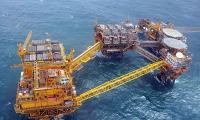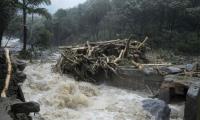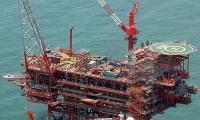ONGC Cuts Helicopter Sorties During Monsoon for Safety
ONGC reduces helicopter flights to offshore installations during monsoon to avoid accidents, extending employee stay to 21 days.

New Delhi, Jun 2 (PTI) India's top oil and gas producer ONGC has slashed helicopter sorties to its installations in the middle of sea on both east and west coast for three months to avoid any repeat of deadly accidents during monsoon that have plagued the firm's otherwise impeccable record, sources said.
Oil and Natural Gas Corporation (ONGC) has raised the duration of work-related stay of its employees at offshore platforms that help produce oil and gas from below seabed, from 14 days to 21 days but still short of the international norm of 28 days.
This temporary measure is only for three months from June to August and has been effected with a view to cut the number of sorties helicopters would need to undertake to ferry men and material to the installations, two sources with knowledge of the matter said.
ONGC did not reply to an email seeking to know why it is following a 21-day cycle when internationally 28-day cycle is followed.
Internationally, personnel manning offshore oil and gas installations are required to stay at oil rigs and platforms for 28 days at a stretch and take an equal number of days off thereafter. The rigs and platforms are equipped with sleeping quarters, kitchens and recreation areas. The 28-day norm is also followed by private sector operators in India.
However, ONGC for no defined reason follows a 14-day cycle -- 14-day stay offshore and 14-day off thereafter.
Of its 25,000 employees, only 1,200 are stationed on offshore installations at any point of time.
The 14-day cycle means helicopters, which are considered the most unsafe flying machines during choppy sea conditions in monsoon period, have to do more sorties to transport men and material. Unlike airplanes, helicopters need to fly through dark clouds which along with a similar coloured sea create unsafe flying conditions during rains.
ONGC had in the past lost precious lives during helicopter sorties in the monsoon period. The last such accident happened on June 28, 2022 when four people died after a helicopter crashed in the Arabian Sea, near ONGC's Sagar Kiran rig.
The helicopter with 9 onboard, was attempting to land at the Sagar Kiran rig, located 111 kilometre west off the Mumbai coast when the incident took place. The helicopter fell into the sea, about 1.5 kilometre from the landing zone on the offshore rig.
The deadliest offshore accident in ONGC history happened in 2003 when 27 people died after a Russian-made Mi-172 helicopter nosedived into the Arabian sea while on a sortie to one of the company's installations. That accident happened a year after a Dauphin helicopter hired by ONGC crashed into sea and four months after a Bell 412 helicopter ferrying ONGC personnel crashed while landing at the Juhu aerodrome in Mumbai.
Sources said ONGC management took the decision keeping safety of its employees in mind.
Last month, Iranian President Ebrahim Raisi and the country's foreign minister were found dead after their helicopter crashed in fog. This raised alarm bells in ONGC.
Sources said ONGC will revert to the 14-day cycle after the monsoon period.
The 21-day cycle for June to August, they said, was not a cost saving measure but primarily a safety issue.
The cutting down of sorties would save the company Rs 8-10 crore in fuel cost, hardly a significant amount considering the annual expenditure of over Rs 96,000 crore, they said adding ONGC only saves on fuel cost as it would continue to pay for the fixed hire charges for the entire period.
ONGC operates multiple offshore platforms and drilling rigs at its Mumbai High and west coast fields in the Arabian Sea, which together produce roughly half of the country's oil and gas. It also operates a similar fleet in Bay of Bengal on the east.
Oil and Natural Gas Corporation (ONGC) has raised the duration of work-related stay of its employees at offshore platforms that help produce oil and gas from below seabed, from 14 days to 21 days but still short of the international norm of 28 days.
This temporary measure is only for three months from June to August and has been effected with a view to cut the number of sorties helicopters would need to undertake to ferry men and material to the installations, two sources with knowledge of the matter said.
ONGC did not reply to an email seeking to know why it is following a 21-day cycle when internationally 28-day cycle is followed.
Internationally, personnel manning offshore oil and gas installations are required to stay at oil rigs and platforms for 28 days at a stretch and take an equal number of days off thereafter. The rigs and platforms are equipped with sleeping quarters, kitchens and recreation areas. The 28-day norm is also followed by private sector operators in India.
However, ONGC for no defined reason follows a 14-day cycle -- 14-day stay offshore and 14-day off thereafter.
Of its 25,000 employees, only 1,200 are stationed on offshore installations at any point of time.
The 14-day cycle means helicopters, which are considered the most unsafe flying machines during choppy sea conditions in monsoon period, have to do more sorties to transport men and material. Unlike airplanes, helicopters need to fly through dark clouds which along with a similar coloured sea create unsafe flying conditions during rains.
ONGC had in the past lost precious lives during helicopter sorties in the monsoon period. The last such accident happened on June 28, 2022 when four people died after a helicopter crashed in the Arabian Sea, near ONGC's Sagar Kiran rig.
The helicopter with 9 onboard, was attempting to land at the Sagar Kiran rig, located 111 kilometre west off the Mumbai coast when the incident took place. The helicopter fell into the sea, about 1.5 kilometre from the landing zone on the offshore rig.
The deadliest offshore accident in ONGC history happened in 2003 when 27 people died after a Russian-made Mi-172 helicopter nosedived into the Arabian sea while on a sortie to one of the company's installations. That accident happened a year after a Dauphin helicopter hired by ONGC crashed into sea and four months after a Bell 412 helicopter ferrying ONGC personnel crashed while landing at the Juhu aerodrome in Mumbai.
Sources said ONGC management took the decision keeping safety of its employees in mind.
Last month, Iranian President Ebrahim Raisi and the country's foreign minister were found dead after their helicopter crashed in fog. This raised alarm bells in ONGC.
Sources said ONGC will revert to the 14-day cycle after the monsoon period.
The 21-day cycle for June to August, they said, was not a cost saving measure but primarily a safety issue.
The cutting down of sorties would save the company Rs 8-10 crore in fuel cost, hardly a significant amount considering the annual expenditure of over Rs 96,000 crore, they said adding ONGC only saves on fuel cost as it would continue to pay for the fixed hire charges for the entire period.
ONGC operates multiple offshore platforms and drilling rigs at its Mumbai High and west coast fields in the Arabian Sea, which together produce roughly half of the country's oil and gas. It also operates a similar fleet in Bay of Bengal on the east.
You May Like To Read
TODAY'S MOST TRADED COMPANIES
- Company Name
- Price
- Volume
- Vodafone Idea L
- 8.10 (+ 18.94)
- 352105814
- GTL Infrastructure
- 1.50 (+ 7.14)
- 20982285
- G G Engineering
- 0.90 (+ 11.11)
- 20091512
- AvanceTechnologies
- 0.54 ( -8.47)
- 18780688
- YES Bank Ltd.
- 17.33 (+ 2.61)
- 14468025







 © 2025 Rediff.com India Limited. All rights reserved.
© 2025 Rediff.com India Limited. All rights reserved.